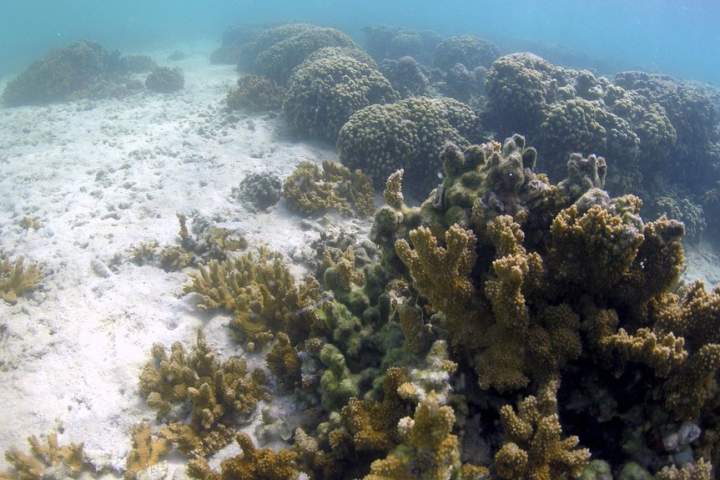Science
Scientists Warn of Coral Reefs’ Near Irreversible Collapse

The world’s coral reefs are facing an alarming decline that scientists warn is approaching a point of no return. In a stark assessment released on Monday, researchers from the Global Tipping Points report indicated that climate change has reached a critical threshold, marking the first “tipping point” in the collapse of these vital ecosystems. The report, compiled by 160 scientists globally, highlights the urgent need for action, coinciding with the upcoming COP30 climate summit in Brazil, which is set to take place near the Amazon rainforest.
The report emphasizes that the Amazon itself is now at risk of significant collapse. This vulnerability arises as average global temperatures threaten to exceed the critical limit of 1.5 degrees Celsius, a threshold that scientists had previously considered safe. According to the report, the deforestation rates in the region necessitate a revision of this threshold, raising concerns about the broader impacts on global climate systems.
As temperatures continue to rise, another critical concern is the potential disruption of the Atlantic Meridional Overturning Circulation (AMOC). This major ocean current plays a crucial role in regulating climate, particularly by ensuring milder winters in northern Europe. “Change is happening fast now, tragically, in parts of the climate, the biosphere,” stated Tim Lenton, the lead author of the report and an environmental scientist at the University of Exeter.
Despite these dire warnings, Lenton pointed out some progress in transitioning away from fossil fuels, which are largely responsible for climate change. Data from the nonprofit think tank Ember revealed that renewable energy sources generated more electricity than coal for the first time this year. “Nobody wants to be just traumatized and disempowered,” Lenton remarked, maintaining that there is still some agency to effect change.
With average global temperatures already rising by approximately 1.3 to 1.4 degrees Celsius above preindustrial levels, scientists have noted the rapid pace of environmental changes. Recent records indicate that the last two years were the warmest on record, with marine heatwaves causing stress and bleaching in 84 percent of the world’s coral reefs. These reefs are home to around a quarter of all marine life, underscoring their ecological significance.
For coral reefs to have a chance at recovery, the world would need to implement drastic climate action aimed at reducing temperatures back down to just 1 degree Celsius above the preindustrial average. “The new report makes clear that each year there is an increase in the scope and magnitude of the negative impacts of climate change,” said Pep Canadell, a senior scientist at Australia’s CSIRO Climate Science Centre.
Currently, the planet is on a trajectory for approximately 3.1 degrees Celsius of warming by the end of this century, based on existing national policies. As the COP30 climate summit approaches, the call for countries to work collaboratively to reduce carbon emissions has become more urgent than ever. The findings of the Global Tipping Points report serve as a stark reminder of the critical crossroads at which the planet stands and the pressing need for immediate and effective climate action.
-

 Lifestyle2 months ago
Lifestyle2 months agoWinnipeg Celebrates Culinary Creativity During Le Burger Week 2025
-

 Health2 months ago
Health2 months agoMontreal’s Groupe Marcelle Leads Canadian Cosmetic Industry Growth
-

 Science2 months ago
Science2 months agoMicrosoft Confirms U.S. Law Overrules Canadian Data Sovereignty
-

 Education2 months ago
Education2 months agoRed River College Launches New Programs to Address Industry Needs
-

 Technology2 months ago
Technology2 months agoDragon Ball: Sparking! Zero Launching on Switch and Switch 2 This November
-

 Science2 months ago
Science2 months agoTech Innovator Amandipp Singh Transforms Hiring for Disabled
-

 Technology6 days ago
Technology6 days agoDiscord Faces Serious Security Breach Affecting Millions
-

 Technology2 months ago
Technology2 months agoGoogle Pixel 10 Pro Fold Specs Unveiled Ahead of Launch
-

 Science2 months ago
Science2 months agoChina’s Wukong Spacesuit Sets New Standard for AI in Space
-

 Technology2 months ago
Technology2 months agoWorld of Warcraft Players Buzz Over 19-Quest Bee Challenge
-

 Business2 months ago
Business2 months agoDawson City Residents Rally Around Buy Canadian Movement
-

 Technology1 week ago
Technology1 week agoHuawei MatePad 12X Redefines Tablet Experience for Professionals
-

 Education2 months ago
Education2 months agoAlberta Teachers’ Strike: Potential Impacts on Students and Families
-

 Business2 months ago
Business2 months agoNew Estimates Reveal ChatGPT-5 Energy Use Could Soar
-

 Science2 months ago
Science2 months agoXi Labs Innovates with New AI Operating System Set for 2025 Launch
-

 Technology2 months ago
Technology2 months agoInnovative 140W GaN Travel Adapter Combines Power and Convenience
-

 Technology2 months ago
Technology2 months agoFuture Entertainment Launches DDoD with Gameplay Trailer Showcase
-

 Technology2 months ago
Technology2 months agoGlobal Launch of Ragnarok M: Classic Set for September 3, 2025
-

 Technology2 months ago
Technology2 months agoArsanesia Unveils Smith’s Chronicles with Steam Page and Trailer
-

 Technology2 months ago
Technology2 months agoNew IDR01 Smart Ring Offers Advanced Sports Tracking for $169
-

 Science2 months ago
Science2 months agoNew Precision Approach to Treating Depression Tailors Care to Patients
-

 Business2 months ago
Business2 months agoBNA Brewing to Open New Bowling Alley in Downtown Penticton
-

 Technology2 months ago
Technology2 months agoHumanoid Robots Compete in Hilarious Debut Games in Beijing
-

 Health2 months ago
Health2 months agoGiant Boba and Unique Treats Take Center Stage at Ottawa’s Newest Bubble Tea Shop










